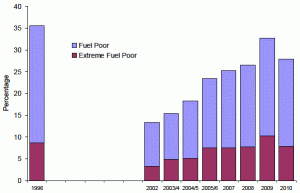Will new price rules give energy consumers a “simpler, clearer, fairer market”?
That’s the claim from Ofgem as they publish reform proposals to tackle widespread consumer confusion over tariffs. Andrew Wright, Senior Partner for Markets at Ofgem, said: “Our reforms today are the blueprint for the simpler, clearer and fairer energy market that consumers deserve. This will provide them with the choices they want alongside the simplicity they need. They have been delivered following two years of engagement with consumers and industry in the most comprehensive ever review of the retail market.”
The main elements are:
- Limit of four ‘core’ tariffs - for each of gas and electricity, and for each payment type. Suppliers will also be able to offer extra fixed term tariffs via collective switching schemes.
- End of ‘dead’ tariffs: If an old tariff isn’t ‘value for money’ then those customers will be moved onto their supplier’s cheapest variable deal.
- Suppliers must give customers personalised info on the cheapest tariff they offer for them and use the new Tariff Comparison Rate in all communications with customers.
- Ofgem will have more power to take action and fine suppliers who treat customers unfairly.
- A ban on price increases during the term of a 'fixed-price' contract.
Norrie Kerr, Director of fuel poverty charity Energy Action Scotland argues the reforms are a step forward, he said: “Many of our concerns have been addressed by the latest Ofgem reforms, which is encouraging. Once in place, however, the marketing of these new actions will be crucial in order to enable consumers to know about and understand the changes. Consumers have been asking for energy issues to be fair and clear. Ofgem’s reforms will move us closer to that point.”
These plans come after research by Consumer Futures and the Joseph Rowntree Foundation shows vulnerable consumers pay up to ten per cent more for their essential services. The report, ‘Addressing the poverty premium’, finds that markets for the utilities and financial services are failing the poorest households in the UK. They call on regulators to put the needs of low-income consumers at the centre of their thinking about whether the markets are working well and to develop and implement consumer vulnerability strategies. The poverty premium can result in poorer households paying up to 20 per cent more on all their utilities (about £8 a week).
Another approach is supported by EDF Energy. They are making the case for the single unit price to Ofgem and also calling for the scrapping of regional prices and standing charges. Which? Executive Director, Richard Lloyd, said: "Rising energy prices are the biggest worry for hard-pressed consumers but many people don't switch to save money because the market is too complicated, so it is good to see EDF Energy backing a single unit price for energy tariffs. Let's hope other suppliers now follow EDF Energy's lead and we see an end to confusing energy pricing soon."
Many in the industry, including us, are sceptical that the Ofgem reforms will make much difference. The best that can be said is, as EAS say, they are a step forward if promoted. Customers could still be faced with up to eighty tariffs, double that if you take into account on and offline options. There is also no obligation for standing charges to be standardised. Most companies keep customers on standard tariffs that can be considerably more expensive and nothing in these rules appear to change that. Ed Davey may welcome the plans, but we doubt if many customers will.
Cross posted from Utilities Scotland


No comments:
Post a Comment